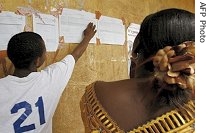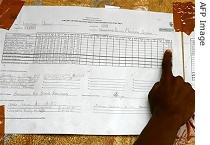2007年VOA标准英语-Preliminary Sierra Leone Vote Count Shows Tight(在线收听)
15 August 2007
Partial results from Sierra Leone's National Electoral Commission show opposition candidate Ernest Koroma leading the presidential race. About 20 percent of the ballots from Saturday's election have been officially released. Unofficial results from an independent vote counting organization show a close race between the opposition and the ruling party. Phuong Tran brings us this report from VOA's West Africa Bureau in Dakar.
 |
| People look at the results of Sierra Leone's presidential and legislative elections in Freetown, 13 August 2007 |
First results from the National Electoral Commission show presidential candidate Ernest Koroma of the opposition All Peoples' Congress Party in the lead with about 200,000 votes. Solomon Berewa of the ruling coalition, Sierra Leone People's Party, has about half as many. Charles Margai of the People's Movement for Democratic Change is running third.
The votes tallied so far account for about 19 percent of the vote.
Unofficial first results from the Independent Radio Network, which has tallied about twice as many votes as the commission, indicate the leading candidates may only be a few thousand votes apart.
 |
| A man checks at the results of Sierra Leone's elections in Freetown, 13 August 2007 |
Spokesman Victor Reider for the ruling coalition's candidate Berewa, also currently the country's vice president, says he is confident the official results will reflect the network's tally.
"We are not worried because the areas that remain to be counted are our strongholds," he said.
Berewa belongs to the Mende ethnic group, the largest in Sierra Leone, which dominates in the south and east.
But campaign spokesman Reider admits a victory of 55 percent or more to avoid a second election, is not likely. He says the campaign is already planning the next round.
"We are ready to go into any form of acceptable understanding with any party that becomes third," he said. "That is politics."
According to the most recent official results, Charles Margai, who broke away from the ruling coalition to form the People's Movement for Democratic Change, is in third place with some 40,000 votes.
Even though Johannesburg-based analyst David Zounmenou with International Security Studies says an opposition-ruling party alliance is unlikely, he says it is possible.
"The ruling party may come up with an agreement of national reconciliation and make some generous offers to PMDC [People's Movement for Democratic Change]," he said.
But the analyst says it is still too early to predict alliances.
This year's legislative and presidential elections are the first that Sierra Leone's government has organized on its own since U.N. peacekeepers left in 2005.
Constitutional term limits prevented President Ahmad Tejan Kabbah from running again.
The country is still recovering from a brutal 11-year civil war that has left the West African country with high unemployment, non-existent roads, and scarce clean water and electricity.